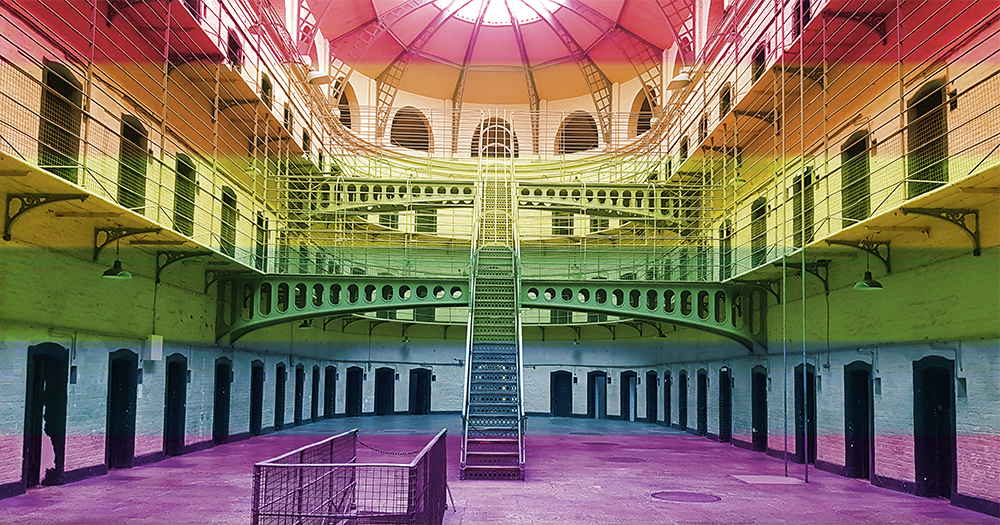As part of Pride month, Kilmainham Gaol will host a series of special tours, focusing on the lives of lesbian, gay, bisexual and transgender prisoners. Many were jailed for their part in the revolution as opposed to their sexuality, according to tour creator and guide, Brian Crowley.
“What I’ve found is that actually it wasn’t that common that people were arrested for same-sex sexual activity, because it’s actually really hard to prove, and it’s a private event,” says Crowley, who is Collections Curator at Kilmainham Gaol. Nevertheless, he has found cases of several arrests at the turn of the century.
The Dublin Castle Scandal of 1884 saw nationalist newspaper United Ireland reveal the sexuality of several high profile figures working in the British administration at Dublin Castle. “With that big scandal, this whole circle of men was also uncovered,” says Crowley. “Some of them were high-up officials, others were middle class and some of them were quite poor men. You get a sense that there was a whole kind of social circle there, and they met together and had parties, and musical evenings. Then afterwards, when everything gets exposed, you can see how people are suddenly suspicious. People are betraying each other, friendships are broken.
“What’s interesting is that even though there wasn’t a huge amount of convictions, the threat of public shame was so great that it really inhibited people from pursuing their lives. When people are being persecuted, you don’t need a huge volume of convictions: It’s the threat. The consequences of being exposed were so appalling at the time. Prison was only a part of it.”
Feeling a bit proud of our Kilmainham Gaol queer history exhibition for #DublinPride @OPWKilmainham @DublinPride pic.twitter.com/ceQOGiKe0t
— Brian Crowley (@BrianCrowley75) June 20, 2019
The tour also looks at the impact of that scandal on Irish law, with an amendment brought in the following year which, in essence, criminalised any sexual act between two men in public or private. This change in the law made it easier to convict gay men, and led to writer Oscar Wilde’s imprisonment in 1895.
The historian also covers the lives of lesbian women prisoners, including assumed lovers Dr Kathleen Lynn and Madeline French Mullen, sent to Kilmainham for their participation in the 1916 Rising. “There’s a very touching entry in Kathleen Lynn’s diary that she kept,” he says. “Initially, they were both put in Kilmainham, so they shared a cell here, and the conditions were very bad. Then later, Kathleen was moved onto Mountjoy, where conditions would’ve been a lot better. But she said that she’d much rather be back in Kilmainham, where they shared a cell, and could see each other every day.”
Crowley also mentions the case of a transgender prisoner in 1889, described as ‘John Bradley’ on arrival at the Gaol. “He had basically been arrested by being homeless,” says the curator. “He started to get very, very nervous as they got closer and closer to washtime. And then John Bradley revealed that, actually, John Bradley was Jane Bradley. But he had lived as a man, and his mother had brought him up as John Bradley. And then he was transferred to Grangegorman Prison, and the newspaper report says that he was ‘ill at ease and female dressed’. And that’s the last we hear of this person.”
All information about this year's festival can be found on our website https://t.co/OemuLOIwJn where you can even download our #DublinPride Guide 2019 ? pic.twitter.com/PUjE3pG3fE
— Dublin LGBTQ+ Pride (@DublinPride) June 19, 2019
What does he hope that people get from the tour? “Sometimes some people think that no one was gay until about 1992,” he laughs. “We’d hope to show that there was a whole world of gay, lesbian and transgender people, and that they were always there. And in some ways, a place like Kilmainham is a space with all those things that society tries to keep hidden. But it’s also where they come to light.”
Even though Irish laws have changed dramatically since the decriminalisation of homosexuality in the ’90s and the introduction of Marriage Equality and Dublin Pride making its way down O’Connell Street once more, does he think we still have a way to go? “Even though things are transformed in lots of ways, it can still be tough for kids in school,” he says. “Or even if you’re out for the night or whatever. You still have to be very careful. What seems like a really small thing to straight people, like just holding your partner’s hand, you still have to think about it. You look around and think, ‘Are we okay, are we alright?’”
‘A Queer History Tour of Kilmainham Gaol’ takes place Saturday 22 June at 10am and 2pm and Tuesday 25 June at 6/6.30pm. The tour is free of charge but places must be booked at [email protected].
This article appears courtesy of DublinLive.ie as part of their Pride coverage.
© 2019 GCN (Gay Community News). All rights reserved.
Support GCN
GCN is a free, vital resource for Ireland’s LGBTQ+ community since 1988.
GCN is a trading name of National LGBT Federation CLG, a registered charity - Charity Number: 20034580.
GCN relies on the generous support of the community and allies to sustain the crucial work that we do. Producing GCN is costly, and, in an industry which has been hugely impacted by rising costs, we need your support to help sustain and grow this vital resource.
Supporting GCN for as little as €1.99 per month will help us continue our work as Ireland’s free, independent LGBTQ+ media.
